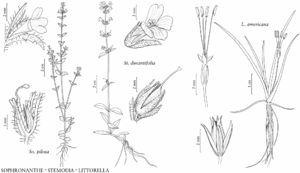Stemodia durantifolia
Observ. Bot., 240. 1791.
Stems erect or ascending, 10–100 cm, glandular- and eglandular-hairy. Leaves opposite or whorled proximally, opposite distally; blade lanceolate to oblong, 15–50(–70) × 3–15(–20) mm, base clasping, margins serrate distally, flat, surfaces sparsely hairy. Inflorescences terminal, spikes, racemes, or flowers 1–4 per axil; bracts 4–5 mm. Pedicels 0–8(–15) mm; bracteoles [1 or]2, 2–3.5 mm. Flowers: calyx lobes narrowly lanceolate, 3–5 mm; corolla blue-purple, 5–8(–10) mm, puberulent, lobes 1–2 × 1 mm; style 2–4 mm. Capsules 4–5 mm; style often persistent. Seeds ellipsoid, 2–3 mm.
Phenology: Flowering year-round.
Habitat: Wet sand and rock in open, sometimes disturbed, sites.
Elevation: 0–400 m.
Distribution
Ariz., Calif., Fla., Mexico, West Indies, Central America, South America.
Discussion
Stemodia durantifolia might be confused with S. maritima Linnaeus, which is found in the Caribbean and along the coast in Mexico and elsewhere in the New World tropics. Stemodia maritima has corollas less than 5 mm and stalked pollen sacs. Florida plants of S. durantifolia are introduced.
Selected References
None.
